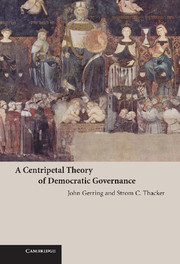Book contents
- Frontmatter
- Contents
- List of Figures
- List of Tables
- Acknowledgments
- A Centripetal Theory of Democratic Governance
- 1 Models of Governance
- PART ONE CAUSAL MECHANISMS
- 2 Party Government
- 3 Conflict Mediation
- 4 Policy Coordination
- PART TWO EMPIRICS
- PART THREE CONCLUSIONS
- Appendix A Defining Good Governance
- Appendix B Alternative Theories Revisited
- Sources
- Author Index
- Subject Index
3 - Conflict Mediation
Published online by Cambridge University Press: 06 July 2010
- Frontmatter
- Contents
- List of Figures
- List of Tables
- Acknowledgments
- A Centripetal Theory of Democratic Governance
- 1 Models of Governance
- PART ONE CAUSAL MECHANISMS
- 2 Party Government
- 3 Conflict Mediation
- 4 Policy Coordination
- PART TWO EMPIRICS
- PART THREE CONCLUSIONS
- Appendix A Defining Good Governance
- Appendix B Alternative Theories Revisited
- Sources
- Author Index
- Subject Index
Summary
A successful polity must institutionalize conflict, integrating diverse groups and competing interests. In the contemporary era, the most troubling species of conflict is the extreme sort often associated with “ethnic” struggles, that is, struggles based on ascriptive identities such as religion, language, race, region, and caste. It is this sort of struggle that seems to pose the greatest threat to social peace, good governance, and indeed to the integrity of the polity. Consequently, it is this sort of struggle that we are primarily concerned with when discussing the topic of conflict mediation, though we imagine that whatever arguments might be advanced with respect to the role of political institutions in extreme conflicts would also be true, a fortiori, of conflict in its more moderate forms.
Some institutional forms seem to work to bring elite actors together, to act in union as part of a larger project. Other institutional forms work to accentuate the differences among elites, offering incentives to individuals to defect from group decisions and to pursue entrepreneurial strategies. We refer to the former as a collegial or cooperative style of politics, and to the latter as an adversarial or individualistic political style.
Our argument, in brief, is that the most effective way to mediate conflict and foster consensus is through political institutions that are, at once, inclusive and authoritative. Conflicts are thereby channeled through representative bodies toward the center. They are broadened in scope (i.e., nationalized), institutionalized, and ultimately, if things go right, amicably settled.
- Type
- Chapter
- Information
- A Centripetal Theory of Democratic Governance , pp. 39 - 61Publisher: Cambridge University PressPrint publication year: 2008



